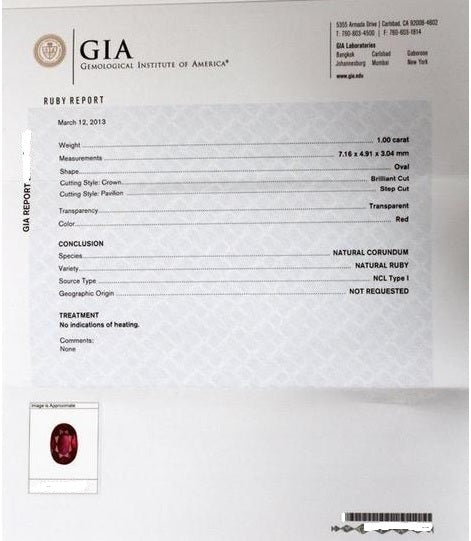August 01, 2019

When looking to buy a natural ruby, there are a few things you should be aware of during your search. Natural rubies may undergo various treatments to enhance their appearance. It is always wise to try to find out what treatments a ruby has undergone because some treatments are not desirable. It is easy to mistake a synthetic ruby for a natural ruby. Thus, it is important to exercise caution and to do your due diligence in researching the history of a ruby before purchasing it.
The majority of all rubies are heat treated right at the place where they are mined. During the heat treatment process, the clarity and color can be improved. This heat treatment process is generally accepted in the gem industry as a routine practice. Untreated rubies command a premium.
Rubies may also be treated with a lead glass-like filling. Most people will want to avoid stones with this treatment, because they can easily be damaged by heat and chemicals.
 Lead Glass in Ruby
Lead Glass in Ruby
All treatments should be disclosed. If you are purchasing an expensive ruby, you should insist on a Ruby Report from a trusted source like the Gemological Institute of America (G.I.A). This will help you become certain that your stone is, in fact, a natural ruby. Also, G.I.A. will identify any known treatments that have taken place and can even indicate the geographic origin of the stone.
In 1903, French chemist Auguste Verneuil successfully invented the first commercial process for producing synthetic rubies. These gemstones are optically, chemically, and physically identical to natural rubies. They are mainly used in watch movements and are known as “jewels” by the watch industry. Since synthetic ruby is very abundant in the marketplace, one should exercise caution by only buying rubies from a reputable source.
 Synthetic Ruby – Photo Courtesy of G.I.A.
Synthetic Ruby – Photo Courtesy of G.I.A.October 19, 2019
October 01, 2019
Pearls are a precious gift from the sea. Keeping them looking beautiful can take special care and patience. After wearing your pearls, it is recommended you wipe them off with a dry cloth.
April 09, 2019